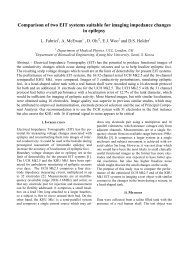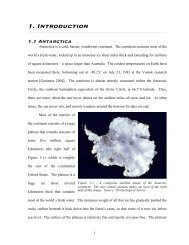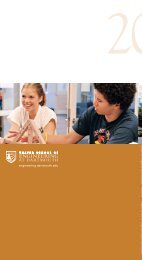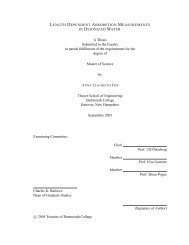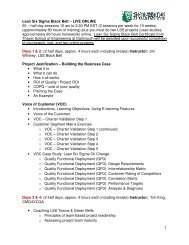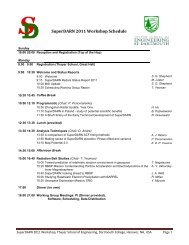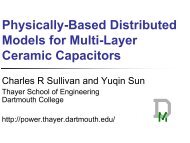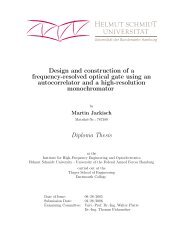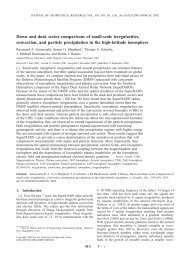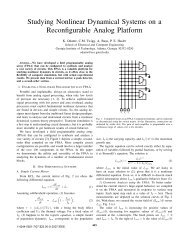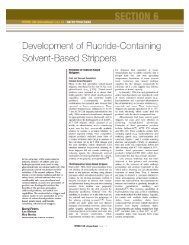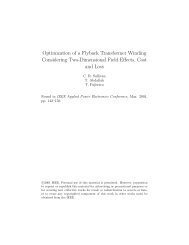Courses Programs - Thayer School of Engineering - Dartmouth ...
Courses Programs - Thayer School of Engineering - Dartmouth ...
Courses Programs - Thayer School of Engineering - Dartmouth ...
Create successful ePaper yourself
Turn your PDF publications into a flip-book with our unique Google optimized e-Paper software.
graduate courses<br />
ENGS 128 Advanced Digital System Design<br />
Offered alternate years: 11S: arrange<br />
Field-programmable gate arrays (FPGAs) have become a major fabric for implementing<br />
digital systems, rivaling application-specific integrated circuits (ASICs) and microprocessors/microcontrollers,<br />
particularly in applications requiring special architectures<br />
or high data throughput, such as digital signal processing. Hardware description<br />
languages (HDLs) have become the dominant method for digital system design. This<br />
course will advance the student’s understanding <strong>of</strong> FPGA design flow and ability to<br />
perform HDL-based design and implementation on FPGAs. Topics include: FPGA<br />
architectures, digital arithmetic, pipelining and parallelism, efficient design using<br />
register transfer level coding and IP cores, computer-aided tools for simulation,<br />
synthesis, and debugging. The course is graded on a series <strong>of</strong> laboratory exercises<br />
and a final project.<br />
Prerequisites: ENGS 31 and either ENGS 62 or COSC 37<br />
Instructor: Hansen<br />
ENGG 129 Instrumentation and Measurements<br />
(Can be used by undergraduates for A.B. course count only)<br />
Offered 11S, 12S: 11, laboratory<br />
A very significant part <strong>of</strong> designing electronic instruments involves selecting the<br />
appropriate physical devices to translate quantities to be measured into voltages or<br />
currents that can be sensed with electronic circuits. The range <strong>of</strong> sensors and transducers<br />
available will be studied with examples from industry and medical instrumentation.<br />
The course will explore in some detail the use <strong>of</strong> analog to digital (A/D) and<br />
digital to analog (D/A) converters and their applications. Students will also learn<br />
to use complete A/D-microprocessor-D/A systems since these are part <strong>of</strong> nearly all<br />
instruments now. In this course students will learn to build a complete instrument<br />
by combining analog and digital components and using advanced algorithms. We<br />
will review the basic concepts from analog electronics and real-time event driven<br />
programming one needs to understand in order to construct such instruments and<br />
experiment through a series <strong>of</strong> labs. The course will culminate with group projects to<br />
induce the students to go through the design process on a problem <strong>of</strong> their choice.<br />
Prerequisites: ENGS 31 and ENGS 61, or equivalent<br />
Instructor: Hartov<br />
ENGS 130 Mechanical Behavior <strong>of</strong> Materials<br />
Offered: 10F, 11F: 9L<br />
A study <strong>of</strong> the mechanical properties <strong>of</strong> engineering materials and the influence <strong>of</strong><br />
these properties on the design process. Topics include: tensorial description <strong>of</strong> stress<br />
and strain; elasticity; plastic yielding under multiaxial loading; flow rules for large<br />
plastic strains; microscopic basis for plasticity; viscoelastic deformation <strong>of</strong> polymers;<br />
creep; fatigue; and fracture.<br />
Prerequisites: ENGS 24 and ENGS 33, or equivalent<br />
Instructor: Schulson<br />
95




